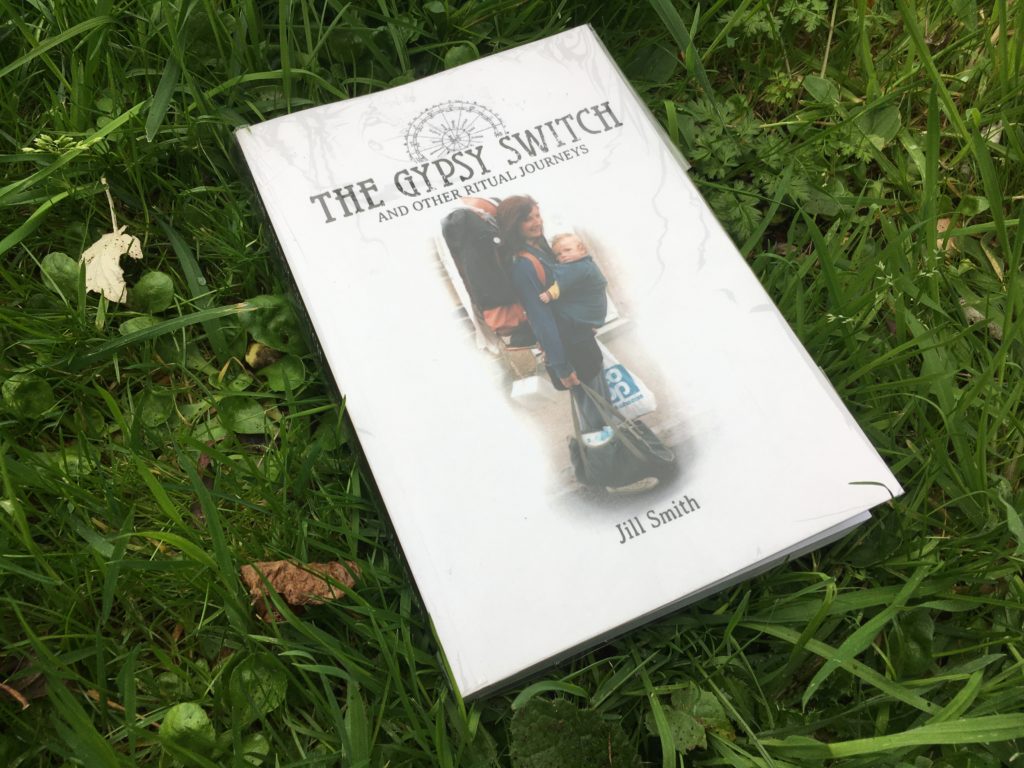The Gypsy Switch and Other Ritual Journeys, by Jill Smith, is the story of the author’s ritual journeying through the sacred landscapes of Britain in the early 1980s. Cally Callomon reviews.

At the recent Folk East Festival I spent time in the East Anglian Fairs Archive tent as I always do. They keep alive the spirit and history of the many fairs that were held in the east during the late 1960s into the following decade. On the stall sat a book for sale, home-published and illustrated, it is by Jill Smith; ex-wife of Bruce Lacey. Lacey was known for his automata, his 1960s performances at various fairs and is immortalised in song on the first Fairport Convention album.
Smith has now reached her mid-70s and has taken it upon herself to write up her memoirs, spawned from the many notebooks and diaries she made on her travels, for travels they were. I thought I’d get only as far as the first few chapters, the ones about the fairs and abandon it after she took to the roads. It’s a long book, it needed heavy editing, but it’s brilliant.
What Jill Smith seems to have done is to have written a first hand account of those fairs but also of her travels north to remote west coast Scottish islands mainly on foot and by hitch-hiking; sleeping ‘rough’ (as we now call it) living off very little.
Her adventures took me to the protests outside Greenham Common and then on an epic journey around these Isles by horse and cart with echoes of the same by Anne Briggs and Vashti Bunyan. Smith started out from our nearby Bungay. She details an era (the early 1980s) which may well have been gentler and kinder to those whose home was on wheels. Inadvertently, perhaps this is a book about so-called ‘New Age Travellers’ and, if so, really needed to be written.
Perhaps ceremony is only really there for us to mark an occasion – but I often find such events a poor attempt at asserting power, an order that may come from supposed invented mysticism. Smith’s orbit of this country, however, is marked by deeply personal ceremony that may be the reason why her memories of place remain so vivid.
Though Smith was not part of a diesel-driven ‘peace convoy’, her journey with two men and two carts takes on a greater significance, an itinerant rant at those modern times, a need to break free: of her failing marriage in failing times. These were the days of Thatcher, where society was deemed dead, where the self became self-important, where entire communities were wrecked due to market forces, where the market was The City and not the markets found in every town and village throughout the land.
The world is a better place for her book, so many may have lost all memory of the generosity of land-owners giving them hay and eggs and milk, of a police force turning a blind eye, confident that, as travellers, they would travel and move on the next day. Smith endured enormous cold and damp, she had a 6-month-old baby to consider (the father of which is refreshingly never mentioned) and despite the airiness of her descriptions this is no new age, no new wage, but an account worthy of comparison to Langland’s Piers Plowman – if not a new Canterbury Tale.
Books like this become rare, they are printed in tiny numbers for a tiny audience and then fall off the shelf. I’m glad to have stumbled across it.
Fully illustrated at 343 pages (softback), it can be bought directly from Smith via jill-smith.co.uk.